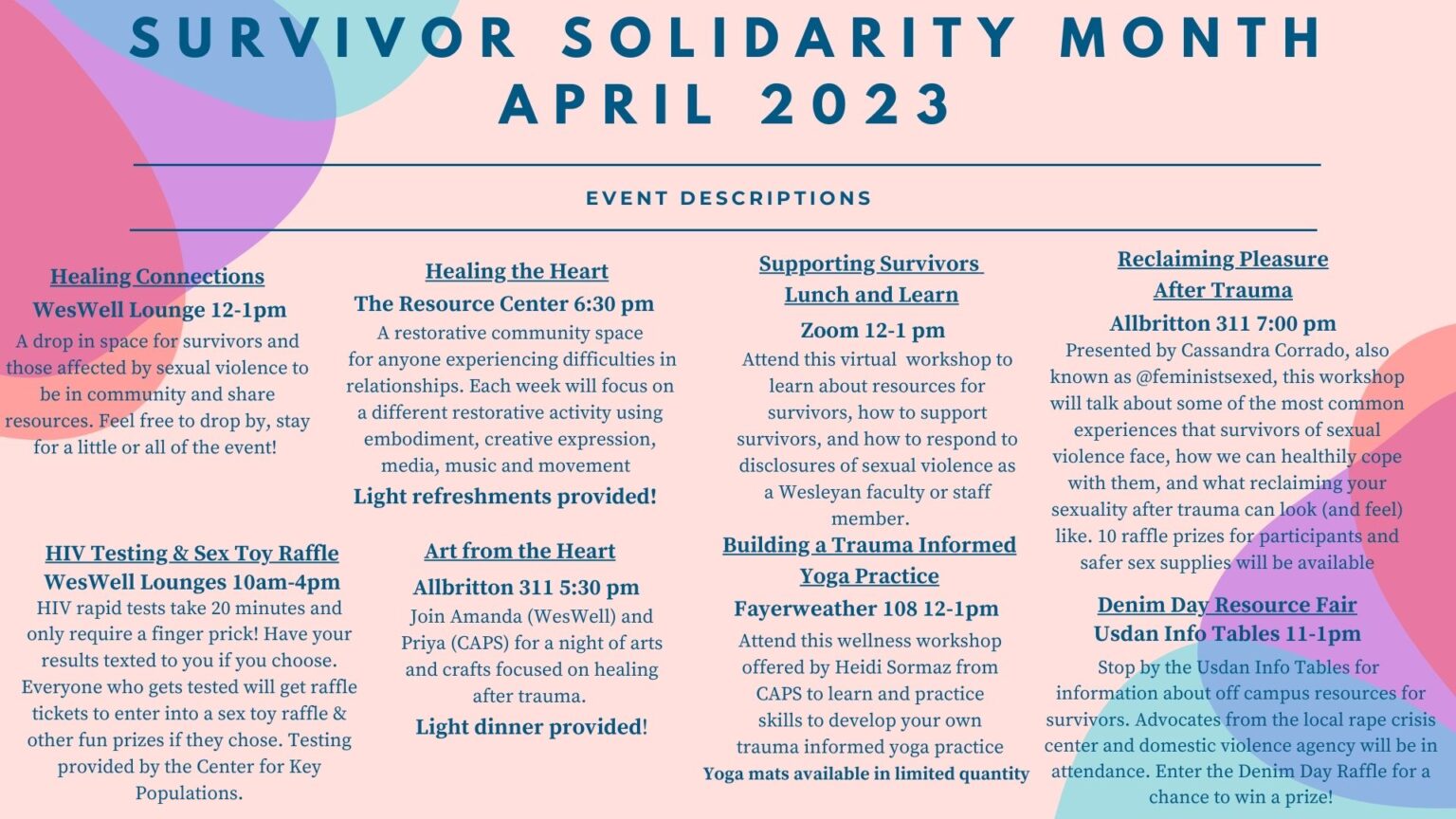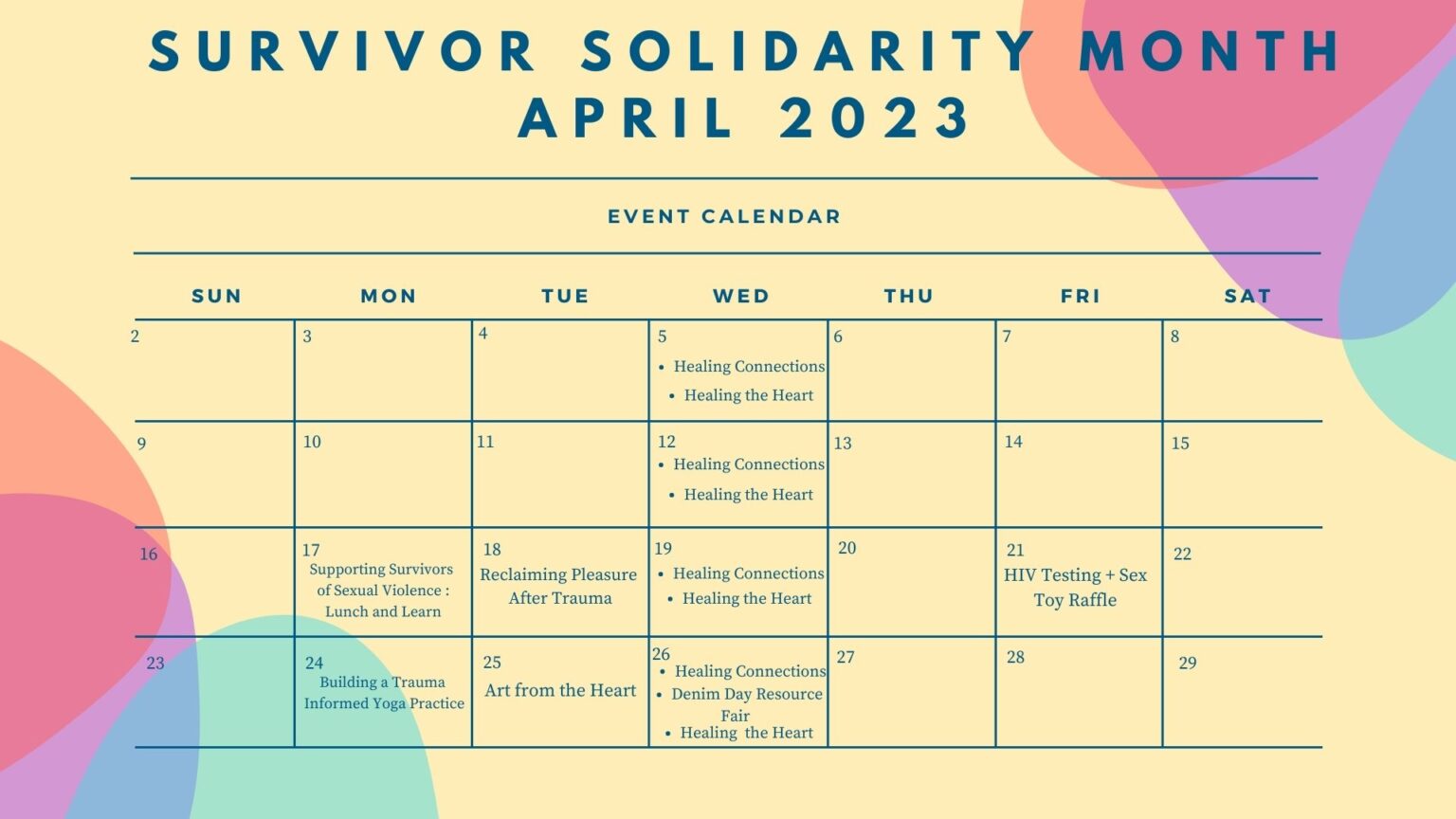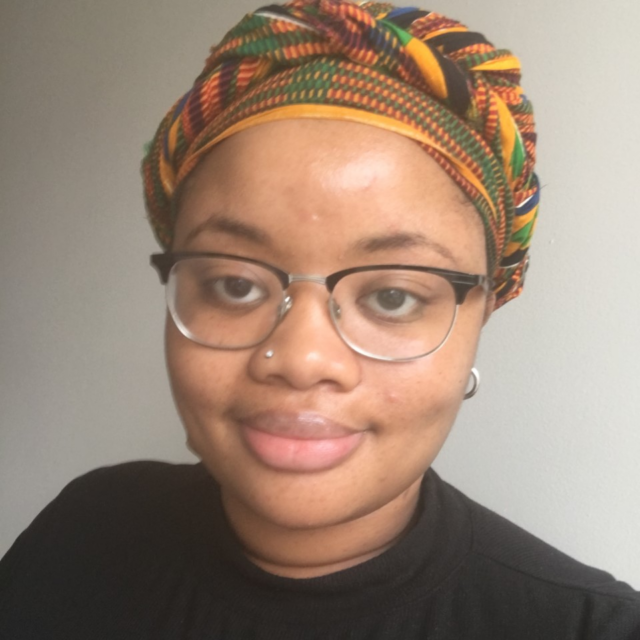
In observance of the sixth annual Survivor Solidarity Month (SSM), the Office of Health Education (WesWell), the Resource Center, and Counseling and Psychological Services (CAPS) have worked together to arrange a number of events and initiatives throughout April to raise awareness about sexual violence and support survivorship. Associate Director for Sexual Violence Prevention Amanda Carrington, CAPS therapist Priya Senecal, and WesWell interns Avanthi Chen ’25 and Charissa Lee ’23 coordinated the month’s events together.
Survivor Solidarity Month is internationally recognized as Sexual Assault Awareness Month and is held in April to promote education and allyship for survivors of sexual violence. According to Carrington, the events are meant to work towards sexual violence prevention on campus.

“The WesWell office coordinates the planning of [Survivor Solidarity Month] events to educate and engage the campus in efforts to imagine a campus free from violence,” Carrington wrote in an email to The Argus. “During SSM campus offices and groups collaborate to offer events that center survivor solidarity, healing, and support.”
Events include Healing Connections and Healing the Heart, both held on each Wednesday in April, workshops such as Supporting Survivors of Sexual Violence (Mon. April 17), Reclaiming Pleasure After Trauma (Tues. April 18), and Building a Trauma Informed Yoga Practice (Mon. April 24), and the annual HIV Testing and Toy Raffle, to be held on Friday, April 21.
SSM organizers underscored that it is crucial to acknowledge the importance of sexual violence prevention and awareness, especially on college and university campuses.
“Hosting SSM events at Wesleyan acknowledges the prevalence of sexual violence on college campuses while uplifting survivor narratives,” Carrington wrote. “It also increases awareness about resources available to students impacted by sexual violence and destigmatizes discussions about sexual violence and other forms of community violence.”
Carrington and Senegal shared that according to the Centers of Disease Control and Prevention (CDC), one in four women and one in six men report experiencing rape or sexual abuse before the age of 18. In addition, about one in five female students and one in 16 male students experience sexual violence through physical force, violence, or incapacitation while in college according to the Rape, Abuse & Incest National Network (RAINN). According to Chen, oftentimes, not enough action is taken to address or prevent sexual violence on college campuses.
“Getting people to take the first step to disclose their experience is so difficult,” Chen said. “And it’s because there is not a lot of faith in the systems that are in place.”
The reporting process can frequently be overwhelming and retraumatizing for a victim of sexual violence, according to Chen, making it difficult for survivors to come forward with their experiences.

Regardless, there are trusted resources on campus that Chen encourages survivors to seek out, including Carrington, Title IX Coordinator Debbie Colucci, and Senegal.
That said, Carrington recognizes that not all students may be aware of what resources are available to them.
“My understanding is that students are unfamiliar with recent changes made to the WesWell office, including its absorption of the former SHAPE office that coordinated survivor advocacy resources.” Carrington said. “It is imperative to increase student awareness about the differences between the resources provided by the Title IX, WesWell, and CAPS offices. I want students to feel better informed about what services each office provides, and what they can expect when encountering staff who work in these offices.”
Some other administrative and confidential on-campus resources include the WesWell office, CAPS, the Office of Religious and Spiritual Life (ORSL), and the Davison Health Center. The Associate Director of WesWell is the only confidential resource within WesWell. Some non-confidential campus resources include Colucci, class deans, Residential Life staff, the Resource Center, and any and all university staff and faculty.
In addition, Carrington highlighted several off-campus confidential resources for sexual violence survivors, namely the Connecticut Alliance to End Sexual Violence and the Connecticut Coalition Against Domestic Violence.
SSM is an opportunity for students to show their solidarity and be better allies to survivors of sexual violence. Carrington said that the events being held in acknowledgement of Survivor Solidarity Month are not just meant for survivors.
“I think it’s important to know that SSM events are open to anyone who wants to attend,” Carrington wrote. “While the workshop content may focus on survivorship, allies can also benefit from being in these solidarity spaces.”
Chen shared that it is important for students to recognize that sexual violence can take many forms.
“Sexual violence can look like so many different things,” Chen said.“People’s experiences and the way that they deal with them is so varied…. I hope that everybody understands that regardless of whether they think [an experience] is ‘that bad’ that they’ll give themselves the time and space to heal and process it, and [I hope] the people around them will treat them and their experiences with as much care as they need and deserve.”
Lastly, Chen also noted that when showing support to a survivor of sexual violence, it is important to acknowledge and listen to their needs.
“I think in terms of supporting survivors, my general rule is just to ask people what they need because what every survivor needs is going to be different,” Chen said.“We can work to create a culture that encourages open conversation and safe communication and try to reduce harm in a lot of ways.”
Students can contact Carrington directly by phone (860-685-2696) or email (acarrington@wesleyan.edu) to seek her support as a confidential resource on campus regarding sexual violence.
Gabby McIntosh can be reached at gmcintosh@wesleyan.edu.


Leave a Reply